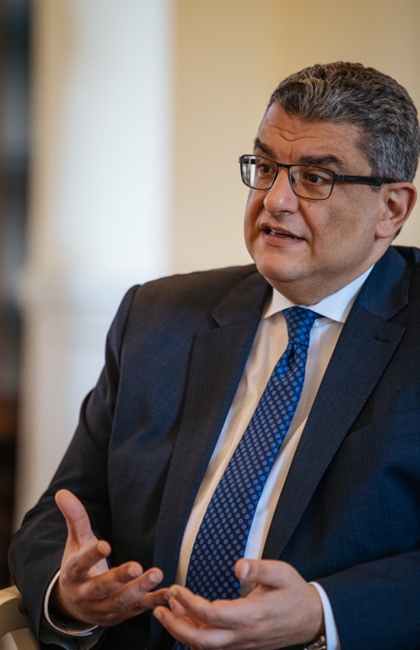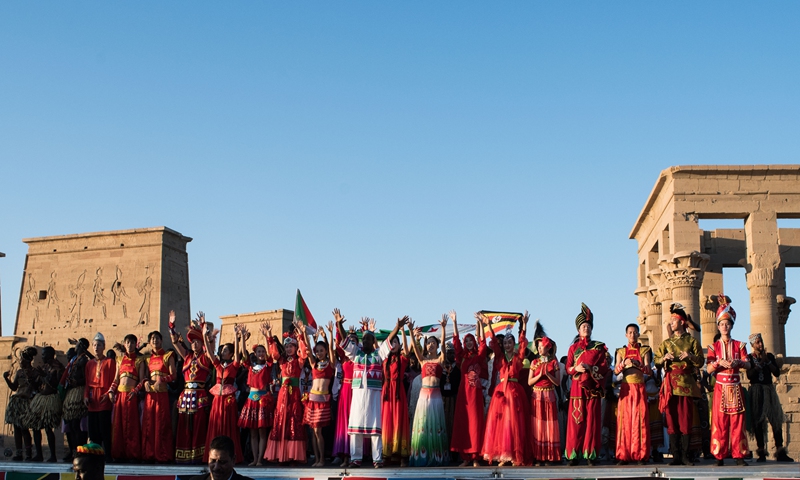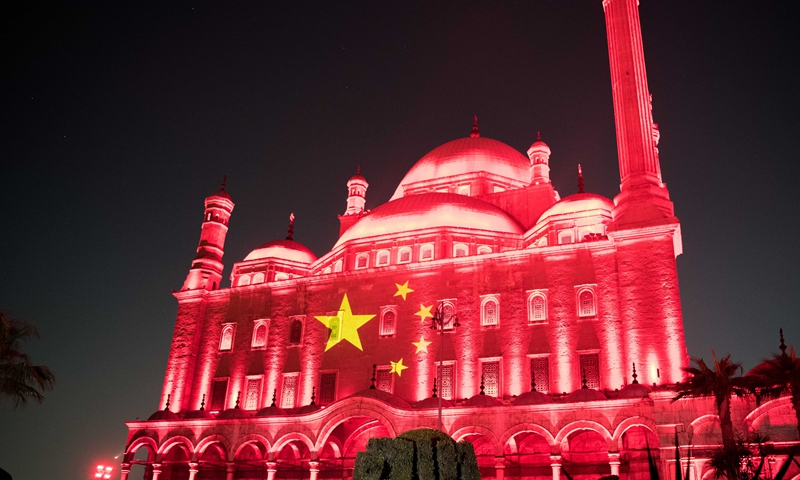Egypt and China: Historical relationship into the future
By Dr. Mohamed El Badri Source:Global Times Published: 2020/5/28 20:25:39

Dr. Mohamed El Badri, Ambassador of the Arab Republic of Egypt to China 
Artists stage a performance at the fourth edition of the Afro-Chinese Arts and Folklore Festival at Philae Temple in Aswan, Egypt, on October 27, 2019. Photo: Xinhua
Two civilization-states are celebrating on May 30th the 64th anniversary of the establishment of official relations between them. It took Egypt and China more than two millennia of unofficial, mainly sporadic, ties to turn it into an official one. It was, and more so now, a shining relationship, with an ascending curve that has transcended all impediments, and is now basing a new stage of turning it to the highest levels of relations both states have with the outside world. But then again it is a normal and expected trajectory based on many foundations which include inter alia the following:
First, improvising on Mackinder's terminology, both states were across time a geopolitical pivot in their world. Both civilization-states, they were the anchors for their respective regions, with the largest population, political strength, cultural establishment, social organization and a strong army.
Second, both states share a similar vision of history, whereby they had to carve their independence to form their state during a very troubled and turbulent 20th century.
Third, both states are very keen in conducting their foreign policy on the principles of international law and respect for others. That is why Egypt and China have a very similar if not a congruent vision on the issues that is of particular importance to them.
Bilateral relations between Egypt and China have evolved across stages since the famous meeting between President Nasser and Premier Zhou Enlai in 1955, where they agreed to establish formal diplomatic relations which materialized in 1956. Egypt became the first Arab, African and Middle Eastern country to establish an embassy in Beijing despite mounting pressures, at a time when Egypt was championing decolonization and self-determination while China was establishing its modern state. Moreover, Egypt has supported the People's Republic of China's membership at the United Nations with a firm belief that it was the rightful representative of the Chinese people.
Since then, Egypt has believed and still fervently upholds the concept of a unified China. Likewise, China has also supported Egypt during all its hardships in the two decades that followed, thereby paving the road for a rather prosperous relationship based on mutual respect and support.
However, a growing transcendental interdependence evolved between the two states lately under the leadership of H.E. President Abd El Fattah Elsisi and H.E. President Xi Jinping. It was their mutual vision to upgrade relations between the two states, especially after China's support to the will of the Egyptian people after the 30th of June Revolution, an act of support that is etched in the memory of every Egyptian and is cast with pride within. It was this support that led President El Sisi to visit China six times since 2014 and a historic visit of H.E. President Xi Jinping to Egypt in 2016. This was combined with a joint strategic dialogue on the level of foreign ministers launched in 2014. This soon gave way to a mutual decision to further upgrade our comprehensive strategic partnership to suit the coming new era during the visit of State Councilor and Minister of Foreign Affairs of China Wang Yi to Egypt in January 2020.
Egypt was among the supporters of the Belt and Road Initiative proposed by H.E. President Xi Jinping in 2013. This support came out of its conviction that it is a unique global initiative on the international table to be forged by the partners themselves to take advantages of what globalization and multilateralism has to offer based on the principles of mutual benefits and respect.
Egypt couldn't miss out on this grand initiative at a time when it is widely considered the main gateway to Africa and the Middle East by controlling one of the most important waterways in the world, the Suez Canal, particularly after the establishment of the New Suez Canal to expand the capacity of this waterway, as well as the Suez Canal Area Development Project and the opportunities it presents to the world. Egypt is determined to work with China to materialize this global initiative. Furthermore, Egypt was also a founding member of the Asian Infrastructure Investment Bank, a visionary multilateral development bank which was initiated by China, and founded by several other countries, with the aim of promoting sustainable development and bridging the financing gap of infrastructure in developing countries, particularly in Asia.
Chinese investment in Egypt and bilateral trade has expanded significantly over the past years. The bilateral trade rose from $11 billion to reach over $13 billion in 2019. Chinese investment in the fields of manufacturing and infrastructure has increased significantly. Indeed the cooperation between both countries aims to further enhance partnership and mutual benefit to both sides. Chinese companies have increased their activities in Egypt as a result of the immense economic structural reform program which Egypt undertook. The reform has yielded great benefits in the form of liberalizing the economy resulting in an attractive business climate that attracted foreign investment and has spurred economic growth. The successful program has been lauded by several international financial institutions such as the IMF and the World Bank. Many renowned Chinese companies working in several fields such as textiles, electronics, energy, automotive and appliances have increased their investments, which acts as a testament to the ongoing success of the Egyptian economic reform program. There are several exemplary models of cooperation such as the first phase of the China-Egypt TEDA Suez Economic and Trade Cooperation Zone. This comprises 84 enterprises including 42 manufacturing companies and has attracted significant foreign direct investment since its establishment. The project is currently developing its second phase. Additionally, China State Construction Engineering Company (CSCEC) is partaking in one of Egypt's most significant national flagship projects by developing the business district of the New Administrative Capital of Egypt. Correspondingly, there has also been increased financial and monetary cooperation. In 2016 the Central Bank of Egypt and the People's Bank of China signed a bilateral currency swap agreement worth $18 billion to spur cooperation in this field.
Chinese tourists to Egypt rocketed to reach 450,000 in 2018. New horizons were envisioned until the advent of COVID-19, something that both countries were counting on to balance the deficit of trade & services. Military cooperation is at its height with prospects growing every year.

Saladin Citadel is lit up in red and golden stars to resemble the national flag of China as a sign of solidarity in combating the novel coronavirus in Cairo, Egypt on March 1. Photo: Xinhua
Cultural exchanges have been expanding as well. Today there are more than 2,000 Egyptian students studying at Chinese universities while many Chinese students are studying Arabic and Islamic studies at Egyptian academic institutions. Every year, hundreds of books are being translated into Arabic and Chinese, thereby showing growing cultural ties between the two. This was further strengthened by the establishment of the Egyptian Chinese University in Cairo and it is becoming a beacon for our joint cultural ties.Perhaps cooperation against the COVID-19 pandemic has been a reflection of this relationship. Egypt heralded efforts to support China at the beginning politically, as well as materially, by sending medical assistance. President Elsisi instructed the Minister of Health to visit Beijing with further medical assistance as a sign of support during the crisis while ordering the illumination of several historic monuments with the Chinese flag as a sign of solidarity with the Chinese people and leadership in this fight. As Egypt plunged into the fight against the pandemic, China offered Egypt assistance on three occasions and opened contact for sharing its experience with the Egyptian side.
Relation between Egypt and China today remains exemplary with a very wide margin to expand its potential. It is a relationship rooted by civilization, strengthened by globalization and above all cemented by a joint will to strengthen it. It was never a step in the dark and as the famous philosopher Schopenhauer once said, "Talent can hit a target no one else can … Genius hits a target no one else can see" and the two countries have visionary leaders that will hit the targets that many cannot yet see for the benefits of their two peoples.
The author is Egyptian Ambassador to China
Newspaper headline: Civilizations of vision
Posted in: IN-DEPTH,CHINA FOCUS